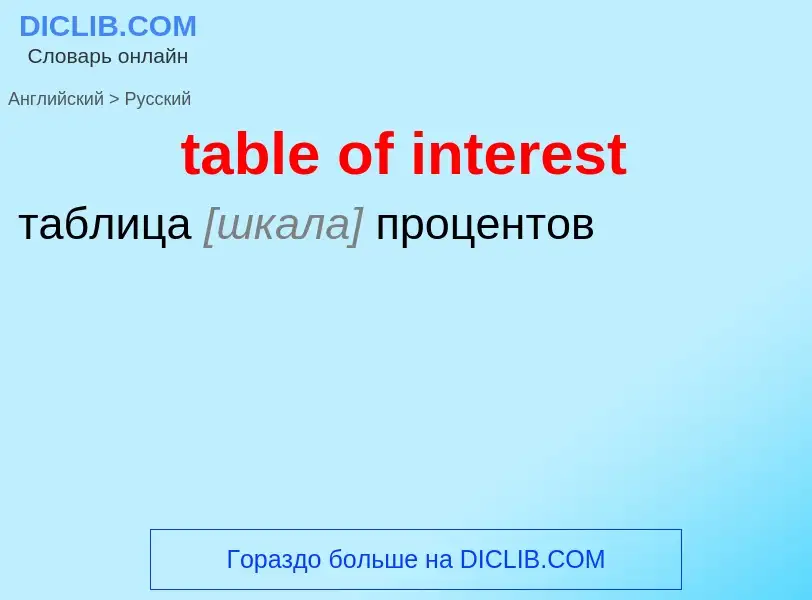ترجمة وتحليل الكلمات عن طريق الذكاء الاصطناعي ChatGPT
في هذه الصفحة يمكنك الحصول على تحليل مفصل لكلمة أو عبارة باستخدام أفضل تقنيات الذكاء الاصطناعي المتوفرة اليوم:
- كيف يتم استخدام الكلمة في اللغة
- تردد الكلمة
- ما إذا كانت الكلمة تستخدم في كثير من الأحيان في اللغة المنطوقة أو المكتوبة
- خيارات الترجمة إلى الروسية أو الإسبانية، على التوالي
- أمثلة على استخدام الكلمة (عدة عبارات مع الترجمة)
- أصل الكلمة
table of interest - ترجمة إلى الروسية
[,vestɪd'ɪntrɪsts]
общая лексика
законные права, преимущественные права, закреплённые законом или традицией
закреплённые законом имущественные права
капиталовложения
крупные предприниматели
корпорации
монополии
заинтересованные круги
закрепленные законом имущественные права
корпорации, монополии
собирательное выражение
крупные предприниматели или компании; власть имущие; высшие промышленные и финансовые круги
تعريف
.
ويكيبيديا
A conflict of interest (COI) is a situation in which a person or organization is involved in multiple interests, financial or otherwise, and serving one interest could involve working against another. Typically, this relates to situations in which the personal interest of an individual or organization might adversely affect a duty owed to make decisions for the benefit of a third party.
An "interest" is a commitment, obligation, duty or goal associated with a particular social role or practice. By definition, a "conflict of interest" occurs if, within a particular decision-making context, an individual is subject to two coexisting interests that are in direct conflict with each other. Such a matter is of importance because under such circumstances the decision-making process can be disrupted or compromised in a manner that affects the integrity or the reliability of the outcomes.
Typically, a conflict of interest arises when an individual finds themselves occupying two social roles simultaneously which generate opposing benefits or loyalties. The interests involved can be pecuniary or non-pecuniary. The existence of such conflicts is an objective fact, not a state of mind, and does not in itself indicate any lapse or moral error. However, especially where a decision is being taken in a fiduciary context, it is important that the contending interests be clearly identified and the process for separating them is rigorously established. Typically, this will involve the conflicted individual either giving up one of the conflicting roles or else recusing themselves from the particular decision-making process in question.
The presence of a conflict of interest is independent of the occurrence of inappropriateness. Therefore, a conflict of interest can be discovered and voluntarily defused before any corruption occurs. A conflict of interest exists if the circumstances are reasonably believed (on the basis of past experience and objective evidence) to create a risk that a decision may be unduly influenced by other, secondary interests, and not on whether a particular individual is actually influenced by a secondary interest.
A widely used definition is: "A conflict of interest is a set of circumstances that creates a risk that professional judgement or actions regarding a primary interest will be unduly influenced by a secondary interest." Primary interest refers to the principal goals of the profession or activity, such as the protection of clients, the health of patients, the integrity of research, and the duties of public officers. Secondary interest includes personal benefit and is not limited to only financial gain but also such motives as the desire for professional advancement, or the wish to do favours for family and friends. These secondary interests are not treated as wrong in and of themselves, but become objectionable when they are believed to have greater weight than the primary interests. Conflict of interest rules in the public sphere mainly focus on financial relationships since they are relatively more objective, fungible, and quantifiable, and usually involve the political, legal, and medical fields.
A conflict of interest is a set of conditions in which professional judgment concerning a primary interest (such as a patient's welfare or the validity of research) tends to be unduly influenced by a secondary interest (such as financial gain). Conflict-of-interest rules [...] regulate the disclosure and avoidance of these conditions.



![Custom [[speed camera]] POI overlaid on a [[BMW]] navigation map Custom [[speed camera]] POI overlaid on a [[BMW]] navigation map](https://commons.wikimedia.org/wiki/Special:FilePath/BMWPoiMap.jpg?width=200)
